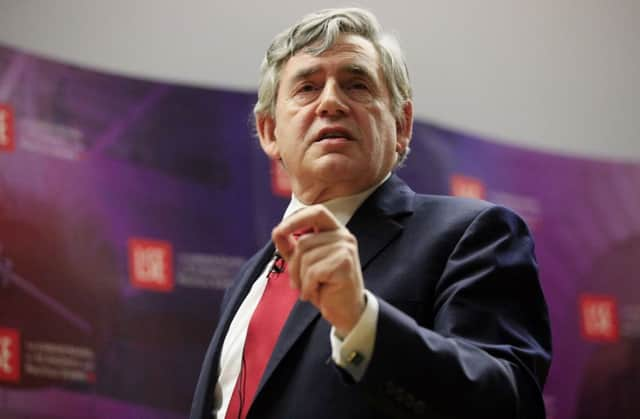Gordon Brown, the leader who left, on leading not leaving the EU


He has an advantage over most commentators, an advantage which enables him to speak with unusual authority; he has a deep knowledge of the workings of the EU. From 1997 to 2010, first as Chancellor of the Exchequer and then as Prime Minister, he was at the heart of Europe, involved in all debates and discussions concerning its functioning and development. He knows from experience that Britain has a powerful voice in Europe and can influence debate and win arguments there.
This is a fair book. Brown is not blind to the attractions of leaving. The arguments of the Leave camp are old ones. They are essentially those which in the 1940s and 50s persuaded both Labour and Conservative governments to refuse to participate in the developments that led to the creation of what was then the European Economic Community. The logic of events proved that refusal wrong, and we eventually joined.
Advertisement
Hide AdAdvertisement
Hide AdBrown has not been a starry-eyed European. As Chancellor he kept us out of the euro, though Tony Blair was in favour of us joining. Nevertheless he successfully argued that Britain should participate in the discussions of the Eurozone countries, because what they decided was of our concern too. As Prime Minister he took the lead in the European response to the global financial crisis.
His argument now is straightforward. In a globalised, inter-dependent world it is in our interest to remain part of the largest transnational trading block in the world. Britain may be an island – more correctly archipelago – but isolation is dangerous and anything but splendid today. The major problems which confront us – international capital flows, inequality, migration from the Middle East and Africa, climate change – are best addressed in collaboration with our European partners. As a member state of the EU we can take the lead; outside it we are more at the mercy of events.
He nails some of the Leave camp’s lies, and dispels many misconceptions. The EU is not going to become a federal state. It will remain an association of nation-states, in which we collaborate with some countries in certain areas.
Much is said about the democratic deficit in the EU, but he points out that the most important decisions are made in the Council of Ministers, by the elected heads of national governments.
Advertisement
Hide AdAdvertisement
Hide AdThe Commission – the EU’s civil service – is not the driving force it was 20 years ago. What we have is a United Europe of States, not a United States of Europe. This indeed is the Gaullist Europe, one in which nation-states lend sovereignty, but do not surrender it; one in which we cede the right to take independent action in some areas, but retain it in other ones.
A good deal of the argument presented in this book is detailed and technical – too much so perhaps for many readers. But it is necessary because it makes the case for our continued membership of the EU as being in our economic interest, as a means of promoting social justice and as “vital for our security”. Our membership of the EU can help us make a better world.
There are balance sheets and statistics galore here, but the book is more than that. In the emphasis Gordon Brown lays on dialogue and co-operation between nations and nation states, he reminds us of why the states of Europe came together in the first place: the determination that the horrors of European war should never be repeated, and the realisation that divergent interests should be reconciled round the council table.
The EU has its faults and weaknesses, and as Scott’s Bailie Nicol Jarvie had it, “there’s nothing so gude on this side o’ time but it might hae been better”. Nevertheless it’s a force for good, the best we have, and Gordon Brown shows how foolish we should be to withdraw from it.